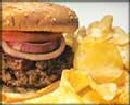Junk food warning labels could work better than taxes, study suggests
The study, conducted by researchers at the University of Alberta, asked consumers to choose between high-fat snacks, some of which carried warning labels, and healthier options. The researchers found that people responded in one of three ways: One group heeded warning labels, another avoided less healthy snacks and was more sensitive to price when a warning label was present, and a third group was sensitive to price but not to warning labels.
The survey of 364 random Canadian grocery shoppers found that price alone did not generally deter shoppers from buying a product, and was least effective for the heaviest consumers. However, most shoppers, including those who were most overweight, did heed a label that warned of high fat content and noted that the item was being taxed because of it.
The hypothetical warning label used in the study read: “This product is high in fat. It has been taxed due to its less healthy nutritional content.”
Sean Cash, an adjunct professor of rural economy at the University of Alberta, who led the study, said: "Based on the reaction of shoppers, a tax seems to be the least effective for the people you want to reach most. If you want to use the tax to change the habits of consumers, it won't be effective. A nickel here and there in tax isn't going to change behaviour in a big way."
Some earlier studies have suggested that a tax on unhealthy foods – sometimes referred to as a ‘fat tax’ – could discourage people from buying these products as it raises their price relative to healthier options. But other studies have implied that small taxes would have limited efficacy in meeting public health goals.
The researchers also pointed out that there is more than one rational way to react to increased taxes.
"For instance, buying less soda pop is a rational response to a tax, but so is buying cheaper soda,” Cash said. “A perverse outcome can actually happen."
The study’s authors suggested that warning labels may work better than taxes as they are more noticeable to consumers at point-of-purchase.
Providing more accessible nutritional information and making healthier foods relatively less expensive than higher calorie options have both been suggested as ways to curb excessive food consumption, and have also been proposed to help offset the cost of treating obesity-related illness, which has been estimated at about $147bn a year in the United States.
Source: Journal of Consumer Affairs
Vol. 45, Iss. 1, pp. 108-122
“Heterogeneous Consumer Responses to Snack Food Taxes and Warning Labels”
Authors: Ryan D. Lacanilao, Sean B. Cash, and Wiktor L. Adamowicz








